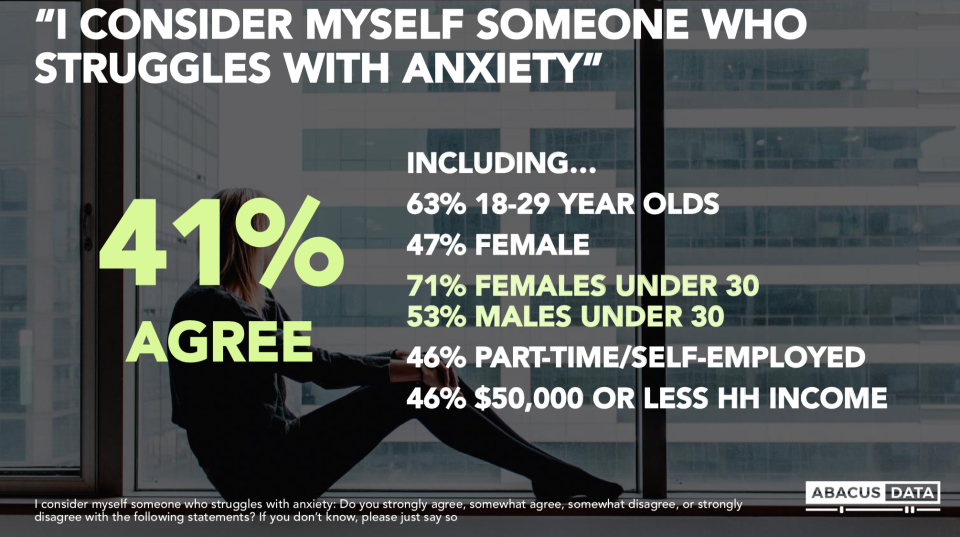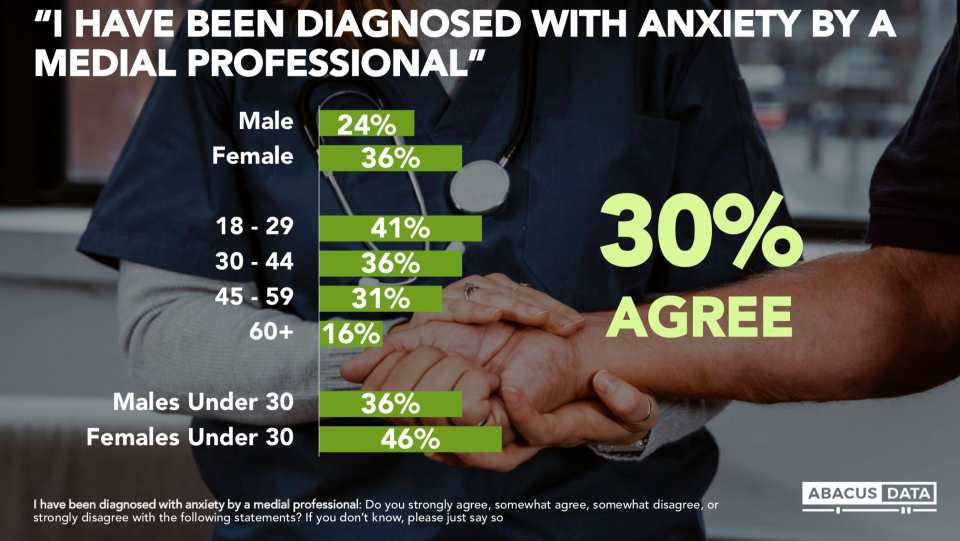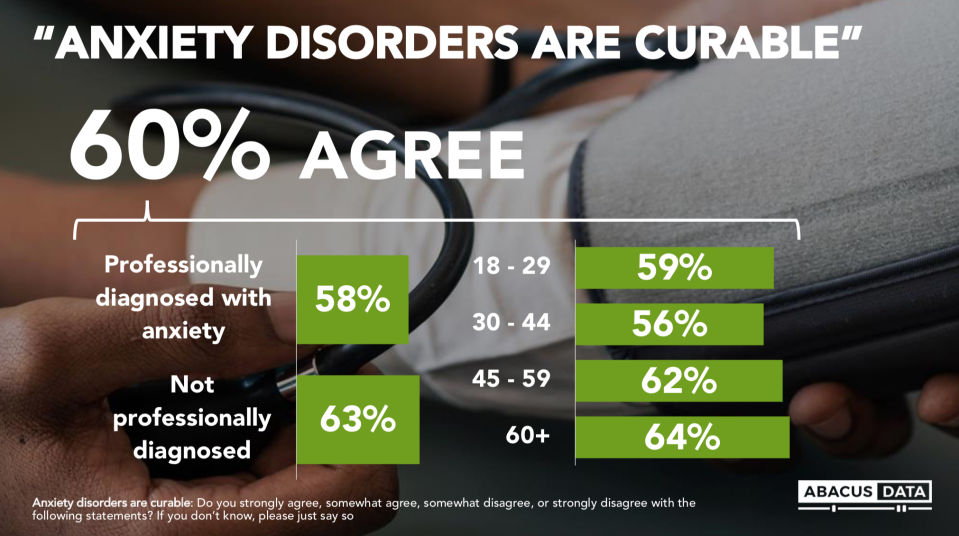What should you do if you think you have anxiety?

In any given year, one in five Canadians will personally experience a mental health problem or illness. By the age of 40, 50 per cent of the population will have or have had a mental illness.
According to data commissioned by Yahoo Canada through Abacus Data, 41 per cent of Canadians identify themselves as struggling with anxiety, while 30 per cent say they have been formally diagnosed with the condition.
But what should you do if you think you have anxiety? It depends on how much your symptoms effect your life.


“Where you would want to be concerned is if you’re having anxiety daily and that anxiety is interfering in your ability to do the things you want to do,” said Dr. Judith Laposa, a clinician scientist and psychologist on the Anxiety Disorders Clinic of the Mood and Anxiety Disorders Division at CAMH.
ALSO SEE: Anxiety and wealth: ‘The fact that they’re anxious means that their lives aren’t perfect’
“Thats when you’d be looking at seeing mental health professional, physician, psychiatrist, psychologist, social worker, etcetera, depending on what the need is in terms of getting some assistance and decreasing those symptoms,” she explained.
According to the survey results, only six in 10 Canadians think anxiety is curable, but with a mix of the right components, experiencing fewer symptoms is possible.

“The main treatments for anxiety disorders include psychiatric medication,” said Laposa. “So typically the class of medications called SSRIs, selective serotonin reuptake inhibitors, tend to be the first line medications for most of the anxiety conditions.”
“The second main way is with psychological therapy, more talk-based therapy,” she continued. “The modality of treatment that has the most empirical research support is something called cognitive behavioral therapy or CBT therapy.”
According to Laposa, each type of anxiety disorder has a particular type of CBT that works specifically for it, so the outcomes for treatment tend to be very good.
“We also know that CBT can form a long term protective advantage and that if you’ve completed a course of CBT where you’re actively changing the way you think and behave, there’s less of a risk of a relapse in the future if you have worked on changing those thoughts and behaviours,” Laposa explained.
As for all the articles across the Internet that say they have the miracle cure for anxiety disorders with listicle tips such as “go for a walk,” or “eat more fruit,” Laposa has some words of caution.
“Those can be helpful and we don’t want to discount the utility of some of these things but they’re probably not sufficient for difficulty,” she said. “We know that if someones anxiety is at the level of a disorder, there are specific interventions that we know are very important and necessary for those anxiety symptoms to go away.”
ALSO SEE: Is anxiety curable? Why that’s the wrong question to ask
Although treatments like CBT can greatly assist in the management of anxiety disorders, personal finances and medical insurance plans come into play for anyone seeking treatment in Canada.
Across the country, antidepressants commonly prescribed to more severe anxiety conditions are subsidized through various government programs. In B.C., there is a Psychiatric Medications Plan available to provincial residents of any age who demonstrate clinical and financial need. Eligibility can be confirmed by a physician or nurse practitioner, local Mental Health and Substance Use Centre, or the local Child and Youth Mental Health services centre.
Psychiatrist services are covered from coast to coast, often if the individual has a referral from a family physician. Counsellors, therapists and psychologists are the services Canadians are largely required to pay out of pocket, unless covered through through private healthcare insurance programs.
“It’s unfortunate that we’re not covered by our health system as psychologists,” said Dr. Felicity Sapp, a Registered Clinical Psychologist in Calgary, Alta. who specializes in CBT. “Left untreated, we’re not really doing great for our country.”
“What we see over the longterm, even once medication or treatment has stopped, is that when people continue to use the skills and respond to those anxious thoughts, those obsessions, the way that they have been taught in treatment with CBT…those gains that they have are going to be maintained,” Sapp explained.
ALSO SEE: Are millennials really the anxiety generation?
Although costs associated with this psychological therapy must be paid out-of-pocket in Manitoba, the Manitoba Farm, Rural & Northern Support Services provides information, support, counseling and outreach to farmers, rural and northern Manitobans of all ages free of charge.
There is also the Quebec Psychotherapy Program for Mental Disorders, which was implemented in an effort to improve access to mental health services in the province and includes psychotherapy. But currently, only people between the ages of five and 18 suffering from depression and living in the Chaudière-Appalaches region can eligible for the program.
“Really, seeking out the treatment is important,” said Sapp. “When symptoms first come up, it can take anywhere from 11 to 14 years before they’re going to get to the proper treatment.”
“Most anxiety disorders are quite responsive to treatment,” said Laposa. “So theres also huge reason to be optimistic that if this is something that someone is struggling with an anxiety disorder, that there are also highly effective treatments for helping people to decrease those symptoms and interference in their life functioning.”
During the month of October, Yahoo Canada is delving into anxiety and why it’s so prevalent among Canadians. Read more content from our multi-part series here.
Let us know what you think by commenting below and tweeting @YahooStyleCA and follow us on Twitter and Instagram.
Abacus Data, a market research firm based in Ottawa, conducted a survey for Yahoo Canada to test public attitudes towards anxiety as a medical condition, including social stigmas and cultural impacts. The study was an online survey of 1,500 Canadians residents, age 18 and over, who responded between Aug. 21 to Sept. 2, 2019. A random sample of panelists were invited to complete the survey from a set of partner panels based on the Lucid exchange platform. The margin of error for a comparable probability-based random sample of the same size is +/- 2.53%, 19 times out of 20. The data was weighted according to census data to ensure the sample matched Canada’s population according to age, gender, educational attainment, and region.


